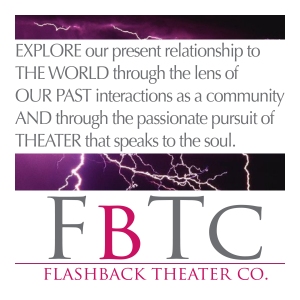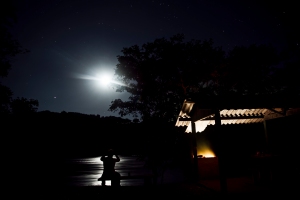Earlier in the summer, I was brainstorming ideas for blog posts and a dear friend suggested I do a post on season planning. I thought it was a great idea and drafted the post but thought I would hold off since I had already gone through the season announcement for the current season. But now I am beginning to consider Flashback’s next season and, conveniently, Howlround started a series on season planning so now seems like a great time to publish. The Howlround series is really fascinating and has Artistic Directors from all over the country in the line-up so be sure to check it out!
—————-
Each year, regional theaters all over the country announce their upcoming year of productions (usually in the spring or early summer). This year I got to join the tradition with Flashback Theater Co. and I couldn’t be more excited for the current season. The funny thing is: I did not realize how much time and work goes into scheduling a season in advance until I went through it. Here is how I did it:
1. Set the logistical requirements for the season. There were several questions that had to be answered to give me an idea of the shape of the season.
- How many shows does the board want to program? I offered my board some options for when we could produce shows, and they decided to produce 4 plays over the next year. The one at the end of this summer is technically in the current season so in the future, our seasons will include 3 shows (if we follow the same schedule). In addition, my board and I decided to fill in the rest of the months of the year with our free event, Let’s Play!, but I won’t go into detail about that here.
- How many cast members will I be looking for? Thinking about the available performance spaces over the next year and the budget constraints I would be under for the purposes of hiring performing artists, I knew the casts had to stay small. At the same time, Last Train to Nibroc was recent enough to remind me that 2 person shows are tough and having minor characters can help keep things on track.
- Likewise, what design limitations will we be under? Space and budgetary constraints come into play here as well, although not as much considering you can do practically any show with stools, a table, and a few hand props. My audience in particular expects some degree of reality in sets and costumes so I had to keep that in mind.
- What seasonal considerations should we take into account? I made sure to look at the holidays happening around the same time as our desired show dates to see if we could tie into anything specifically. Christmas is the big one that everyone programs for but Valentine’s Day is a date opportunity so something a little more romantic in that time period wouldn’t be amiss. Besides holidays, I wanted to keep in mind the season of a play’s setting so I could schedule it during a time when audiences (or actors!) wouldn’t feel disjointed.
2. Set the mission requirements of the season. How will I articulate our mission through the shows we produce? This is the most important requirement of all because this is how I (as the artistic director) tell the community why Flashback Theater Co. is important. (Staying true to the mission is also necessary for maintaining status as a 501(c)3, so that’s an added bonus…and is surprisingly overlooked by some organizations during their programming.)
The mission talks about our past and present as a community and our world but also about theater that speaks to the soul, so there is a lot of room for programming. I definitely wanted a play that was tied into the local community: either by a local playwright or about a local event or person. I also kept thinking about our role in educating the community about theater – so I was looking for a play that would give the audience some perspective of the process of theater and its production. Finally, I wanted to make sure we addressed “the world” part of the mission by choosing a play that was set somewhere outside of the US.
3. Decide which scripts I wanted to order and look at. Knowing what to look for did not make finding potential plays easier, but it saved me from reading scripts that were definitely not going to work, so in the end it was worth it. This was the most tedious part of the process, because it was a lot of searching through play catalogs online, and learning how each site worked and where to look on each for information like cast and set requirements.
(I must say the site with the best search options and user-friendly interface was playscripts.com. They also allow you to download a pretty lengthy preview of most scripts which is really helpful, since descriptions and character lists can only go so far. Reading the first scene can go a long way to knowing whether the play is a possibility or not and I appreciated that I was saved from purchasing a few scripts that were definitely not going to work.)
4. Put plays into the scheduled slots. I would choose a couple of scripts to order, wait for them to come in, read them, and decide if they were a possibility. If one was a yes or maybe, I would write the title on a post-it note and place it in a schedule grid on a sheet of paper. This let me move things around as I filled in the blanks, and has given me a bit of a start on the next season too, since there were some shows I liked that didn’t fit into the current lineup.
5. Inquire about & obtain performance rights for selected dates. Once I had my ideal line up I had to contact each licensing company (with the exception of The Importance of Being Earnest, which is in the public domain) to ask if the rights were available for our area on our dates. I didn’t anticipate this being an issue because the shows I chose are not the big popular favorites, and it wasn’t.
6. Plan budgets for the desired season and get approval from the board. Knowing the desired titles were available for performance opens the way for building a complete budget for each show. This is also the basis for the organization’s operating budget for the upcoming year – so it is a vital part of getting the board’s approval. I can’t program a full season of shows that I expect to lose money, but I can justify programming a show that will likely lose money if it is strongly tied to our mission. This season, that’s Circle Mirror Transformation by Annie Baker. It ties beautifully into the “exploring theater” part of our mission but is a new play that the Somerset audience is going to be challenged by. Again – that’s part of our mission so I didn’t back down from programming it. My board was very trusting of my programming decisions for this year. After we experience the results of the risks I took in this season, I think their feedback for next season will have more direction. And that’s just part of starting a theater company in a city that hasn’t had a lot of non-traditional theater before.
7. Announce the season! After all the work of researching, budgeting, and deciding, the best part is actually announcing the season. I did this at a special Let’s Play! with a slate of performers doing monologues and vocal selections from Broadway numbers. This stayed true to the spirit of Let’s Play! and our mission and was met with positive reactions from my audience.
There are about a hundred little steps to make up each of the above steps. For me, these were the major milestones. The mission has served as the perfect guiding light for our season, and will allow us to continue talking about our mission throughout the year in the context of each show. That is what I consider a programming success. Now…to do it all again!
————————–
Are you a playwright with a script that fits Flashback Theater’s mission? Email me with a synopsis and list of characters. I am always looking for Kentucky based plays to read.


